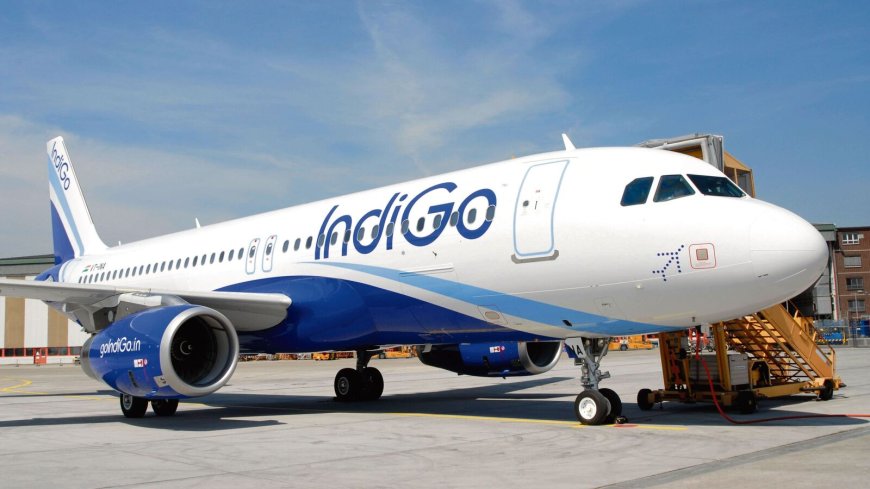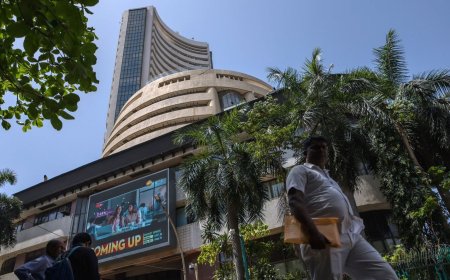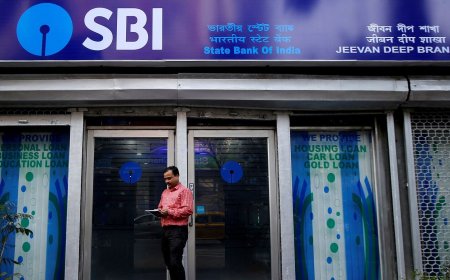IndiGo Share Price Drops 2.5% Amid ₹6,831 Crore Stake Sale by Co-founder Rakesh Gangwal
IndiGo shares fall over 2.5% following news of a massive ₹6,831 crore stake sale by co-founder Rakesh Gangwal. Explore the impact on stock price, company fundamentals, and investor sentiment.

IndiGo Share Price Falls Over 2.5% Amid ₹6,831 Crore Stake Sale by Co-founder Rakesh Gangwal
Mumbai, May 27, 2025 —
Shares of India’s largest airline by market share, IndiGo (InterGlobe Aviation Ltd.), tumbled over 2.5% today after news emerged that co-founder and one of the largest promoters, Rakesh Gangwal, is planning a significant stake sale worth approximately ₹6,831 crore. This development has sent ripples through the investor community, raising questions about the future ownership structure, promoter confidence, and possible implications for the company’s long-term growth outlook.
This article dives deep into the details surrounding the stake sale, the immediate market reaction, and the broader context of IndiGo’s business fundamentals and prospects.
A Major Stake Sale Announcement Shocks Markets
The news broke when regulatory filings indicated that Rakesh Gangwal intends to offload a substantial portion of his holdings in IndiGo through an offer for sale (OFS) or block deal. Estimates suggest the transaction could be worth nearly ₹6,831 crore (about $820 million USD), making it one of the largest single share sales by a promoter in the Indian aviation sector.
Gangwal, who currently holds around 20% stake in the airline, has reportedly decided to monetize a significant chunk of his shares. Although details regarding the exact number of shares and timing remain fluid, market participants immediately responded with caution, reflecting uncertainty about the reasons behind this move.
What Does This Mean for IndiGo Investors?
A promoter selling a large stake often triggers concerns about confidence and corporate governance, which can lead to downward pressure on stock prices. Here are the key considerations for investors:
1. Impact on Share Price
IndiGo shares declined sharply, closing at around ₹1,824 per share, down more than 2.5% from the previous close. The volume spiked as short-term traders capitalized on the negative sentiment. This reaction is understandable given the scale of the transaction and the potential dilution concerns.
2. Why Is Gangwal Selling?
While official statements are awaited, market experts speculate several reasons:
-
Diversification: Gangwal might be looking to diversify his personal investments after years of concentrated exposure.
-
Liquidity Needs: Possible personal or family financial planning could be driving the sale.
-
Changing Promoter Dynamics: IndiGo’s promoter structure has seen changes before, and this may reflect evolving roles.
However, analysts caution that a promoter stake sale does not always signal lack of confidence in the company’s business.
3. Co-Promoter Role and Promoter Confidence
IndiGo’s other co-promoter, Rahul Bhatia, who holds a slightly larger stake (about 35%), has not indicated any similar selling plans. His continued investment is likely to provide some comfort to investors worried about leadership stability.
4. Long-Term Business Fundamentals
Despite short-term volatility, IndiGo remains India’s market leader with a dominant domestic presence, extensive fleet expansion plans, and strong operational efficiency. The airline’s cost leadership and brand recall provide it with a structural advantage amid intense competition.
IndiGo’s Recent Performance & Industry Context
Strong Recovery Post-Pandemic
The Indian aviation industry has rebounded strongly after the Covid-19 pandemic disruptions. IndiGo, leveraging its extensive network and economies of scale, recorded a robust recovery in passenger volumes and improved profitability in FY24-25.
Q4 FY25 Highlights
-
Revenue: ₹12,500 crore, up 18% YoY
-
Passenger Load Factor: 89.2%, one of the highest in the sector
-
Profitability: Net profit of ₹480 crore, marking a steady return to pre-pandemic levels
-
Fleet Size: Expanded to 320 aircraft, with plans to add 50 more by FY26
These fundamentals underpin the long-term growth story of IndiGo and the positive outlook of India’s aviation sector.
The Aviation Sector Outlook: Growth Mixed with Challenges
Growing Middle-Class & Rising Air Travel Demand
India’s growing middle class, improved connectivity, and rising disposable incomes continue to drive domestic air travel demand. The government’s UDAN scheme and airport modernization efforts also support sector growth.
Challenges to Watch
-
Fuel Price Volatility: Jet fuel prices remain unpredictable, directly impacting operating costs.
-
Regulatory & Tax Environment: Changes in aviation taxes and levies can affect margins.
-
Competition: Low-cost rivals like SpiceJet, Akasa Air, and AirAsia India remain aggressive.
-
Macroeconomic Risks: Global economic uncertainties could dampen discretionary travel.
IndiGo’s focus on operational efficiency and network expansion should help it navigate these headwinds better than peers.
What Should Investors Do Now?
Given the current developments, investors must weigh the short-term risks against the long-term growth prospects.
Considerations:
-
For Existing Investors: Stay calm, assess your investment horizon, and avoid panic selling. Stake sales by promoters are part of corporate lifecycle, not always a red flag.
-
For New Investors: Monitor the market reaction and wait for clarity on the stake sale details. Consider accumulating on dips if you believe in IndiGo’s long-term fundamentals.
-
Portfolio Diversification: Aviation stocks are inherently cyclical and susceptible to external shocks. Ensure proper diversification across sectors.
IndiGo’s Journey Ahead Amid Promoter Stake Sale
The announcement of Rakesh Gangwal’s ₹6,831 crore stake sale has understandably rattled markets and caused short-term price corrections. However, IndiGo’s underlying business remains robust, backed by strong leadership, a wide market moat, and a favorable demand environment.
While promoter stake sales attract attention, they are not necessarily indicative of distress or faltering business prospects. Long-term investors would do well to view this as a market opportunity to evaluate their exposure in India’s leading airline.
As the story unfolds, the key will be transparency from the company and maintaining investor confidence through sustained operational performance.
What's Your Reaction?
 Like
0
Like
0
 Dislike
0
Dislike
0
 Love
0
Love
0
 Funny
0
Funny
0
 Angry
0
Angry
0
 Sad
0
Sad
0
 Wow
0
Wow
0












































































